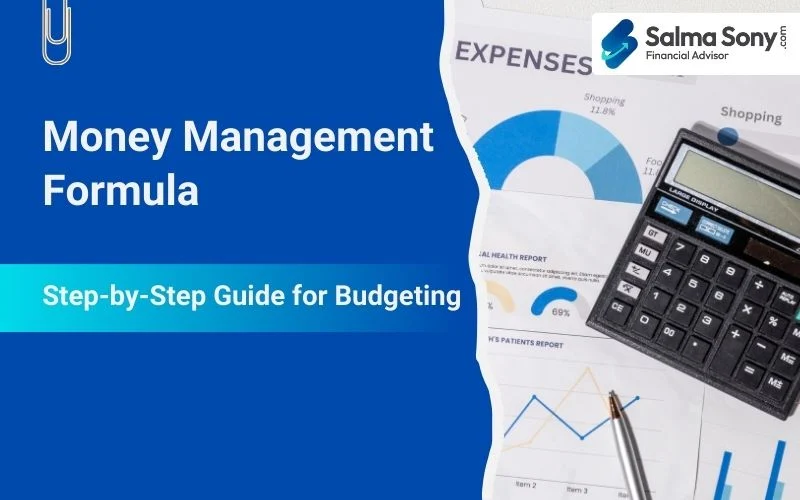Money management is about understanding your spending pattern by planning, budgeting, and tracking your expenses. In this article, I am sharing the four simple money management tips for beginners that will be helpful for individuals, be they salaried employees or business professionals.

Money Management Tips for Beginners helps them
- Build confidence
- Live a better lifestyle.
- Reduce stress about your financial goals.
- Build wealth faster
How to Manage Your Money Better?
There is no one way to manage your money better. You need to take multiple actions to make it work for you.
[1] Determine Your Monthly Income
If you are a salaried employee, pick up your post-tax salary.
For a business person, it will be sales value less fixed expenses.
In India, we have five sources of income:
- Salary Income
- Rental Income
- Business/Professional Income
- Capital gain income
- Other sources of income
If you have any other income apart from salary or business/professional income, then include that to find your total income.
[2] Create a Budget and Track
- Creating a budget is the most critical step toward better money management. Creating a budget means listing down your expected expenses.
- Once you know your expected monthly expense, that becomes your benchmark. Start tracking every payment, even if it is Rs. 10. This will help you improve your finances as you will have your benchmark to compare with your budget.
- By tracking your expenses, you will know where your money goes and can avoid overspending and staying within your budget.
- If you are clueless about how to begin, start tracking your expenses for three months, and an average of 3 months becomes your benchmark.
💡Pro tip: Create a realistic budget that works with your lifestyle and spending habits. The idea is to improve your lifestyle by opting for better habits like eating home-cooked food more often, avoiding overspending due to impulse purchasing, etc.
Refrain from over-expecting yourself, do it slowly. A habit change needs some time, so give yourself time to yourself adapt to the habit change. Slow and sturdy wins the race.
– Pay your bills every month before the due date
- Paying bills before the due date is an easy way to manage your money, and it helps avoid late fees and prioritize essential spending.
– Reduce useless recurring expenses
Review the recurring spending; you might not be making the best use of it. You must have opted for it because you thought it would be helpful. But if you last used the services three months ago, then unsubscribe and reduce your recurring expenses.
– Self-Control Practice by paying cash, not credit
- If you don’t have control over your purchases, then start using cash instead of using cards, be it credit cards or debit cards. Post-salary credit withdraws 50% of your household expenses and starts using money, especially in places where you have chances of impulse purchasing. By doing so, you begin feeling cash outflow and have self-control over your purchases.
- Buying through an online portal is another hack to save you from impulse purchases. You buy only things you need and easily save up to 10-15%, as in stores like Amazon and Flipkart grocery; you always have amazing offers. If you stay in a big city, then DMart can be another great option to help you save a lot by buying online or at the store.
- If you are disciplined at paying bills on time, then using a credit card like a debit card can help accumulate points, and that points can use to buy household accessories, flight tickets, etc., depending on the type of credit card.
- If you have a habit of spending before earning, you are in a dangerous zone. Spending before earning happens when you swipe your credit card in advance and wait for your salary to get credited to pay the outstanding bill. Stop this habit, even if you are disciplined at paying bills on time. One mistake of converting the outstanding bill to EMI may slowly get you into a debt trap where you may pay somewhere between 24% -50 % interest to the bank/credit card company.
– Plan for annual expenses
Certain expenses come annually or semi-annually, or quarterly like insurance premium payments, school fees, etc. Planning for such recurring expenses can give you a sense of relief and peace of mind. The best way to plan these expenses is to start monthly investments in debt mutual funds and redeem the payment amount when it’s due. This way, you create a system for better money management and earn a small return.
– Save first, spend later
Saving first and spending is a game changer; it is possible to do this only when you work on your budget. With budgeting, you will know how to save consistently by moving the budgeted amount for savings to another account as soon as your salary gets credited and taking care of monthly expenses with the rest of the money.
[3] Avoid Debt / Loan
Debt is like rust for your investment. With bigger or more expensive loans, your overall net worth growth will be at stake even if you take high risk. No loan is an ideal situation. Change your mindset and start being comfortable with SIP (Systematic Investment Plan) rather than EMI (Equal Monthly Investment). In both cases, you start keeping equal installments aside every month.
In the case of EMI, you work for the bank by paying them interest, and in SIP, you work for yourself by paying growth to your invested money.
Be wise, plan your finances, opt for SIP, and work for yourself.
💡Pro tip: Open two bank accounts- One for savings and another for investment and transfer the saving amount to the account allocated for investment as soon as the salary gets credited.
[4] Set Financial Goals
Setting financial goals can help you
- Get clarity
- Give you the reason and encourage you to save more
- It helps take calculated risks
- It helps achieve peace of mind.
So, before you jump into an investment, do your homework on getting clarity in goals.
Do not make your investment decisions based on what friends and relatives are doing.
Remember, an investment that may work for them may not work for you!
Choose your investment based on your goals and risk appetite.
– Be prepared for emergencies
People often think emergencies will never come to me; they always happen to their neighbors. Unfortunately, your neighbor also feels the same, and the next door to your neighbor is yours. Emergency always gives surprises. Be prepared and protect yourself against emergencies, so it doesn’t sweep away your long-term savings; this is the only way to make your money management fail-proof.
– Save up cash to afford big purchases
If you plan well, big purchases like a home or car can be bought without a loan. Doing so saves you from paying interest and avoids rust in your wealth creation process.
– Start an investment strategy
Financial planning helps create an investment strategy based on your needs and requirements. Starting early with a proper investment strategy will be a game changer.
Starting early will give your investment more time to grow, which means you can achieve your goal with less monthly investment or with more investment can achieve your goal faster.
The power of compounding needs time to show its magic.
[5] Beware of Bad Advice: Educate Yourself
Financial awareness is a must, do not rely on random advice from unqualified people, be it friends, relatives, or colleagues. Take charge of your financial future, read a few books on personal finance, and follow the process.
If you have a financial responsibility towards your family and look forward to structured financial planning, then do not hesitate to connect with an expert fee-only SEBI Registered Investment Adviser (RIA). If needed, take the help of professionals.

Conclusion
Money management is the starting point of your wealth creation. Who masters it saves well. Following these four basic rules can help you save more, invest more, and create wealth faster, and allow you to live the rest of your dreams.
Important Articles related to Personal Finance
- Objective of Investment
- Tax Planning For Salaried Employees
- Investment Planning For Salaried Employees
- Mutual Fund KYC Online Registration
- How To Invest In Direct Mutual Funds?
- How To Start SIP Investment In Mutual Funds?
Frequently Asked Questions
Q-1: How to Manage Your Money Better?
1. Determine Your Monthly Income 2. Create a Budget and Track 3. Avoid Debt / Loan 4. Set Financial Goals





